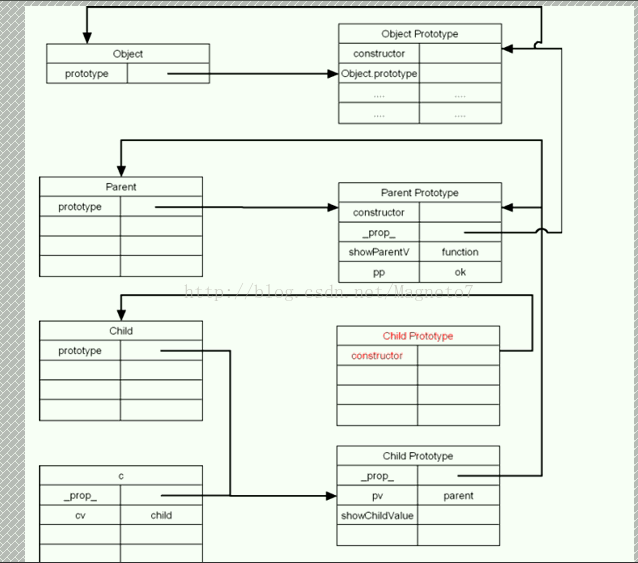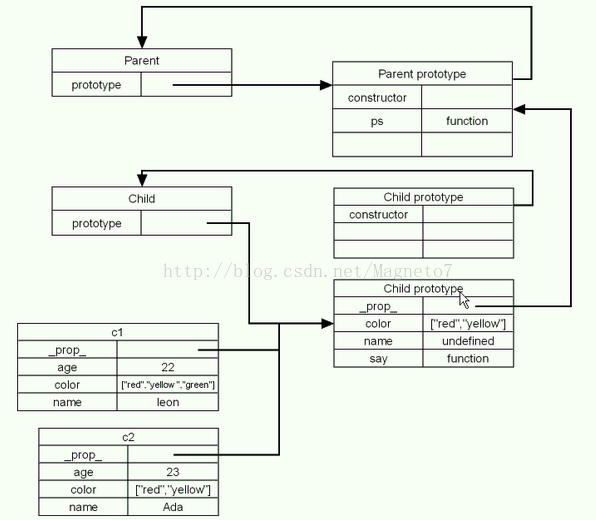js:深入继承
2020-12-13 01:47
标签:js /** function Child(){ var c = new Child(); /** 所以一般都不会单纯的使用原型链来实现继承。 二、基于伪造的方式 function Child(){ //但是这依然不太好,如下: function Child(name,age){ 三、基于组合的方式 function Parent(name){ function Child(name,age){ var c1 = new Child("Leon",22); 原创文章如转载,请注明出处,本文首发于csdn网站:http://blog.csdn.net/magneto7/article/details/25010555 js:深入继承,搜素材,soscw.com js:深入继承 标签:js 原文地址:http://blog.csdn.net/magneto7/article/details/25010555
* js实现继承:
* 1.基于原型链的方式
* 2.基于伪造的方式
* 3.基于组合的方式
*/
一、基于原型链的方式
function Parent(){
this.pv = "parent";
}
Parent.prototype.showParentValue = function(){
console.log(this.pv);
}
this.cv = "child";
}
//让Child的原型链指向Parent,也就等于完成了一次继承
Child.prototype = new Parent();
Child.prototype.showChildValue = function(){
console.log(this.cv);
}
c.showParentValue(); //parent
c.showChildValue(); //child
*在使用原型链进行继承时,应注意以下问题:
*1.不能在设定了原型链之后,再重新为原型链赋值
*2.一定要在原型链赋值之后才能添加或者覆盖方法
*/

使用原型链继承的缺点是:
1.无法从子类中调用父类的构造函数,
2.如果父类中存在引用类型,这个引用类型会添加到子类的原型中,如果一个对象修改了这个引用,其它对象的引用同时修改
function Parent(){
this.color = ["red","blue"];
}
//在Child中的this应该是指向Child的对象
//在调用Parent方法的时候,而且this又指向了Child,就等于是:this.color = ["red","blue"];
//也就等于在Child中有了this.color属性,这样也就变向的完成了继承
Parent.call(this);
//Parent(); 这种调用方式,只是完成了函数的调用,根本无法实现继承
}
var c1 = new Child();
c1.color.push = "green";
console.log(c1.color); //red,blue,green
var c2 = new Child();
console.log(c2.color); //red,blue
------------------------------------------------------------------------------
function Parent(name){
this.color = ["red","blue"];
this.name = name;
/*this.say = function(){
console.log(this.name);
}*/
}
Parent.prototype.say = function(){
console.log(this.name);
}
/**
* 使用伪造的方式就可以把子类的构造函数参数传递到父类中
* 存在问题:
* 1.由于使用的伪造方式,不会完成Child的原型指向Parent,所以对Child来说say方法不存在
* 解决方案:
* 将这个方法放到Parent中,使用this来创建
* 但是这又引起前面提到的问题:
* 每个Child对象都会有一个say,占用空间,所以也不应单独的使用伪造的方式实现继承。
* 因此我们要使用组合的方式来解决这个问题
*/
this.age = age;
Parent.call(this,name);
}
var c1 = new Child("Leon",13);
var c2 = new Child("Ada",22);
console.log(c1.name+","+c1.age);
console.log(c2.name+","+c2.age);
组合的方式是:属性通过伪造的方式实现,方法通过原型链的方式实现。
this.color = ["red","blue"];
this.name = name;
}
Parent.prototype.ps = function(){
console.log(this.name+",["+this.color+"]");
}
this.age = age;
Parent.call(this,name);
}
Child.prototype = new Parent();
Child.prototype.say = function(){
console.log(this.name+","+this.age+",["+this.color+"]");
}
c1.color.push("green");
c1.say(); //Leon,22,[red,blue,green]
c1.ps(); //Leon,[red,blue,green]
var c2 = new Child("Ada",23);
c2.say(); //Ada,23,[red,blue]
c2.ps(); //Ada,[red,blue]